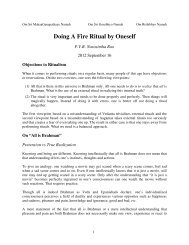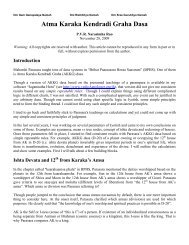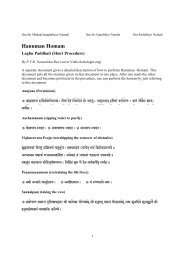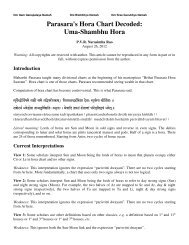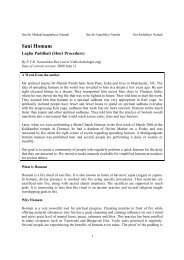The Glory of the Goddess-Devi Mahatmyam
The Glory of the Goddess-Devi Mahatmyam
The Glory of the Goddess-Devi Mahatmyam
Create successful ePaper yourself
Turn your PDF publications into a flip-book with our unique Google optimized e-Paper software.
depressed in mind?” Hearing <strong>the</strong> empa<strong>the</strong>tic enquiry <strong>of</strong> <strong>the</strong> king, <strong>the</strong> merchant bowed<br />
respectfully and replied to <strong>the</strong> king. “I am a merchant named Samadhi, born in a wealthy<br />
family. I have been cast out by my unworthy sons and wife, through greed for my wealth. My<br />
wife and sons have misappropriated my riches, and made me devoid <strong>of</strong> wealth. Cast out by<br />
my trusted kinsmen, I have come to <strong>the</strong> forest grief-stricken. Dwelling here, I do not know<br />
anything about <strong>the</strong> welfare <strong>of</strong> my sons, kinsmen and wife. How are my sons? Are <strong>the</strong>y <strong>of</strong><br />
good conduct or <strong>of</strong> or evil ways?”<br />
<strong>The</strong>reupon <strong>the</strong> king asked <strong>the</strong> merchant, “Why is your mind affectionately attached to those<br />
covetous folks, your sons, wife and o<strong>the</strong>rs, who have deprived you <strong>of</strong> your wealth?” <strong>The</strong><br />
merchant replied, “This very thought has occurred to me, just as you have uttered it. But what<br />
can I do? Unable to detach my mind bears deep affection to those very persons who have<br />
driven me out in <strong>the</strong>ir greed for wealth, abandoning love for a fa<strong>the</strong>r and attachment to one's<br />
master and kinsmen. Although I know it I do not comprehend how <strong>the</strong> mind is prone to love<br />
even towards worthless kinsmen? On account <strong>of</strong> <strong>the</strong>m I heave heavy sighs and feel dejected.<br />
What can I do since my mind does not become harsh towards those unloving ones?”<br />
<strong>The</strong>n <strong>the</strong> merchant Samadhi and <strong>the</strong> noble king Suratha toge<strong>the</strong>r approached sage Medhas<br />
and after observing <strong>the</strong> etiquette worthy <strong>of</strong> him and as was proper, <strong>the</strong>y sat down and<br />
conversed with him. <strong>The</strong> king said: “Sir, I wish to ask you one thing. Pray, reply to it. Not<br />
being under <strong>the</strong> control <strong>of</strong> my intellect, my mind is afflicted with grief. Though I have lost<br />
<strong>the</strong> kingdom, I have an attachment to all <strong>the</strong> paraphernalia <strong>of</strong> my kingdom. Though I know<br />
<strong>the</strong> actuality how is this sense <strong>of</strong> ‘mine’ afflicting me like an ignorant man, O best <strong>of</strong> sages?<br />
And this merchant has been disowned by his children, wife and servants, and forsaken by his<br />
own people; still he is inordinately affectionate towards <strong>the</strong>m. Thus both he and I, drawn by<br />
attachment towards objects whose defects we do know, are exceedingly unhappy. How is it<br />
that even <strong>the</strong> knowledgeable are deluded? This delusion besets me as well as him, blinded as<br />
we are in our ability to discern.”<br />
As his name implies (medhas: intelligence or wisdom), sage Medhas is a wise man, <strong>the</strong> seer<br />
who knows. Here knowledge, intelligence and wisdom are not merely intellectual but intuitive<br />
and insightful as well. <strong>The</strong> wise sage does not start advising <strong>the</strong>m directly. Instead he<br />
addresses <strong>the</strong>ir predicament indirectly as a wise counsellor would in this sort <strong>of</strong> a situation.<br />
<strong>The</strong> sage replied to <strong>the</strong> king’s query as follows. “Sir, every being has <strong>the</strong> knowledge <strong>of</strong><br />
objects perceivable by <strong>the</strong> senses in various ways. Some beings are blind by day, and o<strong>the</strong>rs<br />
are blind by night; some beings have equal sight both by day and night. Human beings are<br />
certainly endowed with knowledge, but <strong>the</strong>y are not <strong>the</strong> only beings to be so endowed, for<br />
cattle, birds, animals and o<strong>the</strong>r creatures too cognise. <strong>The</strong> knowledge that men have, birds<br />
and beasts also have; and what <strong>the</strong>y have men also possess; and <strong>the</strong> rest like eating and<br />
sleeping is common to both <strong>of</strong> <strong>the</strong>m. Look at <strong>the</strong>se birds, though <strong>the</strong>y are <strong>the</strong>mselves afflicted<br />
by hunger and are aware <strong>of</strong> it, because <strong>of</strong> delusion, <strong>the</strong>y are engaged in feeding grains into<br />
<strong>the</strong> beaks <strong>of</strong> <strong>the</strong>ir young ones. Human beings too are, attached to <strong>the</strong>ir children expecting in<br />
return. Do you not see this?”<br />
“Even so men are hurled into <strong>the</strong> whirlpool <strong>of</strong> attachment, <strong>the</strong> pit <strong>of</strong> delusion, through <strong>the</strong><br />
power <strong>of</strong> Mahamaya <strong>the</strong> Great delusion, who makes <strong>the</strong> continuance <strong>of</strong> <strong>the</strong> cycle <strong>of</strong> worldly<br />
existence possible. Marvel not at this. This Mahamaya is <strong>the</strong> Yoganidra, <strong>the</strong> Superconscient<br />
sleep <strong>of</strong> Vishnu, <strong>the</strong> Lord <strong>of</strong> <strong>the</strong> world. It is by her <strong>the</strong> world is deluded. Verily she, <strong>the</strong><br />
10



